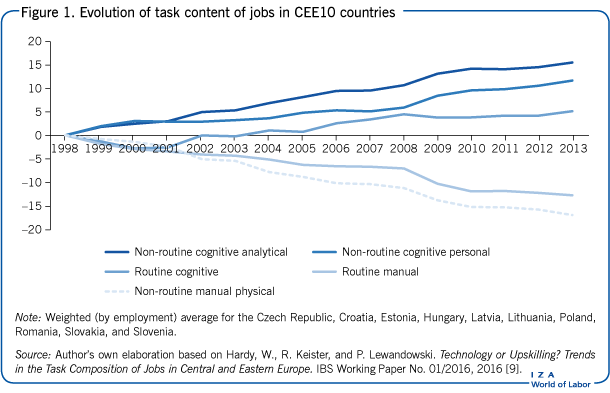IZA World of Labor has just published the article “The changing nature of jobs in Central and Eastern Europe” wrote by Piotr Lewandowski – the president of our Institute. The article describes and analyses the changes in the task content of jobs in Central and Eastern Europe (CEE). The topic of the task content of jobs has been analysed in our Institute since 2015.
We are proud that the results of the studies conducted within our Institute were published by the renowned publishing series targeted at policymakers, politicians and people interested in labour market issues all over the world. Piotr Lewandowski is the third author from Poland whose article was published by IZA World of Labor. The previous contributions being:
- Redesigning pension systems – by Marek Góra
- Does it pay to be beautiful? – by Eva Siermińska
In his article Piotr Lewandowski highlights the large routine cognitive task intensity of jobs in the Central and Eastern European countries, which is important as such jobs could be susceptible to automation and computerisation in the future.
The risks of the increasing importance of routine cognitive task intensity of jobs
The aggregate restructuring in CEE during the 1990s triggered a substantial shift from manual to cognitive work. Job polarisation and the decline of middle-skilled jobs can pose serious problems for the emerging economies.
The example of CEE shows that the structural changes of economies, as well as increasing levels of education can prevent job polarisation. These processes can contribute to a shift from manual to cognitive work and prevent the “hollowing out” of middle-skilled jobs. In CEE they indeed prevented job polarisation but they also increased the importance of routine cognitive jobs. These changes introduce new risks as such jobs can be susceptible to automation and computerisation in the future.
For more details we encourage to read the full article “The changing nature of jobs in Central and Eastern Europe”. All papers published by IZA World of Labor are available for free on the website www.wol.iza.org.
In contrast to EU15, in CEE the role of routine cognitive jobs is growing

***
In July 2016, Piotr Lewandowski the President of the Institute for Structural Research (IBS) joined an international group of renown economists within IZA Research Fellows (Institute for the Study of Labor / Forschungsinstitut Für Zukunft der Arbeit, Bonn, Germany). The RePEc (Research Papers in Economics) ranks IZA second of the top worldwide economic institutions in the field of labour economics as well as third of the top worldwide think tanks.

